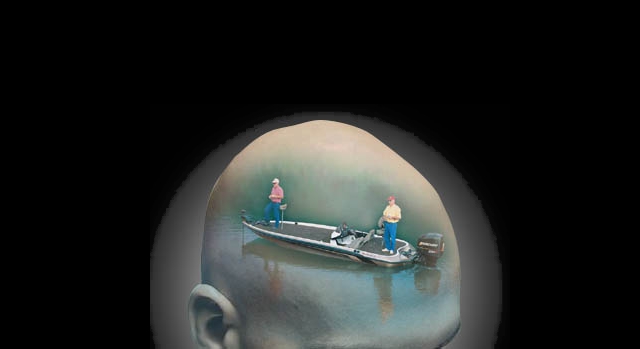Performance Psychology
Maximizing your brainpower

Successful fishing is a complex process requiring mastery over your intellect, emotions, and behavior. To consistently catch fish you have to be able to think clearly, control your emotions, and act efficiently, displaying both urgency and care, depending on the issues at hand.
Based on the natural skills you were born with, and what you learned through life experiences, you already have some sense of mastery over your intellect, emotions, and behavior. However, performance psychology techniques allow you to take this mastery to a much higher level. It’s kind of like fishing with a cane pole, dacron line, and a bobber, versus using a graphite rod, a 10 ball-bearing spinning reel, and premium fluorocarbon line. You can catch fish with either, though most of us would rather have the spinning outfit, eh? In subsequent articles I will talk about mastering emotions and behavior. For now let’s focus on using your intellect for maximum effectiveness.
In addition to my performance psychology work, I also do pre-employment and promotional evaluations for several large companies. When evaluating job applicants, intellectual capacity (brainpower) is a good predictor of whether someone will be successful or not. First and foremost, you have to be smart enough to do the job at hand. If you can’t figure out how to do the work of accounting, mechanical drafting or bricklaying, it’s unlikely you’ll be successful at those jobs.
What is equally important is how you use and develop your intellectual skills. Physical strength is a great analogy. The body you were born with has a certain amount of arm and leg strength, though if you want to, you can go to the gym, work out, lift weights and get substantially stronger. Similarly, regardless of the natural intellect you have, there are a number of things you can do to strengthen and expand your analytical and problem-solving abilities.
Category width is a great concept, one that all would-be successful anglers should get to know. It refers to how wide or inclusive your mental categories are. So for example, one of the categories you use (whether you know it or not) is pre-spawn bass baits. For starters, take a look at what’s in that category now. You probably have spinnerbaits and jerkbaits, and you might also have jigs and rattle-baits. Would you consider making your pre-spawn bait category bigger? How do you do that? Well, you could review magazine or Web site articles on pre-spawn tournaments in your area for the last five years. Take note of the lures the top five finishers used, and see if you might add one (or three) of these to your arsenal.
Alternately, you might think about shrinking or consolidating one of your categories. Last summer, I helped a guy in our bass club “evaluate” his plastic-worm category. We started in his boat, moved to the garage and ended up in his basement. By actual count, we sorted through 326 bags of plastic worms, some of them dating back to 1976, based on sales receipts stapled to the bag. For this guy, shrinking this category will make finding and using plastic worms a lot easier.
Intellectual flexibility is one of my favorite performance psychology concepts. Like some of you, I have a remarkable capacity to get into a mindless, chunk-and-wind routine during which many minutes, sometimes hours, go by while I have not had a single conscious thought about what I’m doing. Of course, if while doing this every 10th cast produces a four-pounder, then I would say keep it up. However, that’s not usually the case, and I end up being zoned-out, rather than “In the Zone.”
Several intellectual or cognitive flexibility techniques can be helpful here. One of them is no more complex than using the alarm on your watch or cell phone. Let’s say you are practice-fishing for a tournament, and you want to make sure you don’t get into a rut. Set your alarm for 15 minutes and when it rings ask yourself: “Do I want to keep doing this for another 15 minutes, or do I want to change something?” Maybe you decide to change spots, or perhaps you may change something subtle like casting angle, the size or color of lure, or your retrieve speed. Even if you change nothing at all, you are giving yourself an opportunity to sort through options and make proactive decisions rather than just getting into a mindless, non-thinking routine that fails to utilize your intellectual talents.
Whatever your natural intellect might be, just remember there are lots of ways performance psychology can help you stretch, strengthen, and expand your skills to become an even more effective angler.

————————————————–
Jay T. McNamara, Ph.D., L.P., also known as Dr. Fish, has published his book “The Psychology of Exceptional Fishing.” You can order it by contacting Jay via e-mail at this address: [email protected].
————————————————–
Jay T. McNamara, Ph.D., L.P., is a psychologist, who is also an avid bass and walleye angler. With more than 27 years of professional experience complemented by participation in competitive fishing at local and national levels, he is uniquely qualified to illustrate how performance psychology principles apply to tournament fishing.